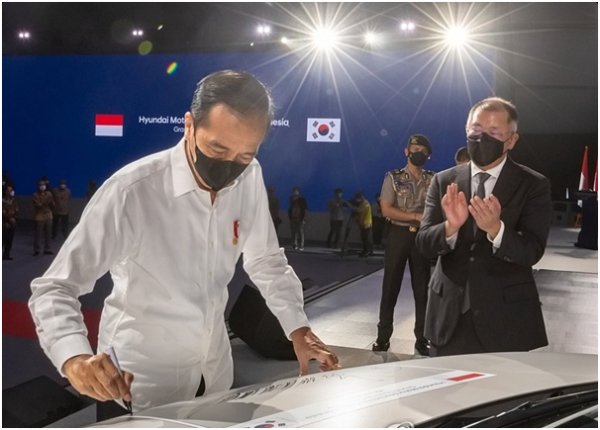Steering Towards Global Markets: The Impact of International Alliances on Indonesia’s Automotive Sector
The Indonesian automotive sector is undergoing significant transformations, with international alliances playing an important role in this evolution. These partnerships are influencing design, production, and the export landscape, particularly in the context of electric vehicles (EVs) and sustainable practices.

Indonesian President Joko Widodo (left) signs on an IONIQ 5 electric vehicle in a ceremony marking the inauguration of Hyundai Motor Manufacturing Indonesia in Deltamas industrial complex near Cikarang, 40 kilometers east of the capital city of Jakarta, on March 16. Credit : Businesskorea(https://www.businesskorea.co.kr)
Strengthening Regional Collaboration and Advancing Sustainable Automotive Solutions
The Malaysia Automotive Robotics and IoT Institute (MARii) and the Indonesia Automotive Institute (IOI) have signed a Memorandum of Understanding (MoU) to foster growth in the automotive sectors of both nations. The partnership aims at enhancing automotive manufacturing, parts localization, and exports. It is a significant step towards establishing the ASEAN Automotive Institute, promoting cleaner fuels, and improving battery manufacturing for a more sustainable automotive future.
The significant investment by Hyundai in establishing an EV production facility in Indonesia marks a crucial shift towards sustainable automotive solutions. This partnership underlines Indonesia’s commitment to becoming a regional leader in EV production. Indonesia’s collaboration with leading Japanese automakers like Toyota and Daihatsu has long been a cornerstone of its automotive industry. These partnerships have facilitated technology transfer, enhanced local manufacturing capabilities, and improved vehicle design to meet global standards. Companies like LG Chem and Contemporary Amperex Technology Co. Limited (CATL) are investing in battery production facilities in Indonesia. These investments are crucial for developing the local EV ecosystem and are aligned with Indonesia’s strategy to leverage its nickel resources for battery manufacturing.
Impact on the Indonesian Automotive Industry
The Indonesian automotive sector, driven by local and foreign investments, has been adapting to these global trends. The introduction of Low Cost Green Cars (LCGC) and the government’s tax incentives have made Indonesia an attractive market for both domestic and international players. This has led to increased production and sales within the country, contributing to its growing middle class and evolving consumer preferences. This move towards more affordable and fuel-efficient vehicles aligns with the global shift towards sustainability and could position Indonesia favorably in the international automotive export market.
The automotive industry in Indonesia, led by major players like Toyota, Daihatsu, and Honda, is centered in regions such as Bekasi, Karawang, and Purwakarta in West Java. These areas have developed into significant automotive production bases due to their convenient location and well-developed infrastructure. The Indonesian government’s vision to transform the country into a global production base for car manufacturing, aiming to surpass Thailand as the largest car production hub in Southeast Asia, reflects the broader trend of integrating digital platforms and focusing on the production of electric vehicles as part of a strategic industry shift.
In response to emerging digital technologies and stricter regulatory standards, the Indonesian automotive industry is witnessing a new wave of consolidations and alliances. Companies are forming partnerships to share costs, access new markets, and integrate cutting-edge technologies without the complexities and financial burdens of mergers. In Indonesia, Toyota has introduced connected car services through the Toyota Connected Service, offering features such as vehicle telematics, emergency assistance, and real-time vehicle tracking. This service enhances driver safety and convenience, aligning with the global trend towards connected vehicles. Daihatsu, in collaboration with Astra International (one of Indonesia’s largest automotive groups), has been exploring digital innovations. They launched an integrated online service platform that allows customers to book service appointments, view maintenance history, and receive real-time updates on their vehicle’s service status, enhancing customer service and vehicle maintenance through digital solutions.
Future Outlook
These partnerships, particularly with Japanese automakers, have led to a significant transfer of technology and expertise, helping to establish Indonesia as a notable player in the automotive manufacturing sector in Southeast Asia. For businesses, these collaborations mean access to advanced technologies, improved manufacturing processes, and entry into new markets. The collaboration has spurred growth and competition within the local market, compelling Indonesian automotive businesses to innovate and adapt to global standards. This international involvement has not only enhanced Indonesia’s export potential but also increased its attractiveness as a destination for foreign investment in the automotive sector.
International collaborations can lead to more sophisticated supply chains and procurement strategies as local companies integrate into global networks. This means Indonesian automotive companies gain access to high-quality materials, advanced components, and cutting-edge technologies at competitive prices, enhancing their product offerings and competitiveness.
Furthermore, as foreign companies establish their presence and invest in Indonesia, there could be a shift towards localized procurement to reduce costs and meet requirements for local content, providing a significant boost to local suppliers and manufacturers. This local sourcing requirement encourages the development of domestic industries, leading to job creation and skill development.


